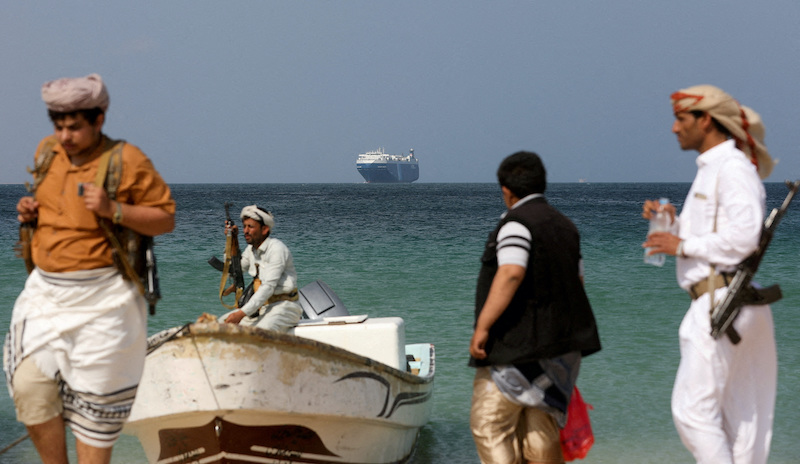A spate of militant attacks on vessels transporting cargo through the Red Sea — one of the world’s most used trade routes — is starting to take a toll on global commerce.
Shippers are currently moving around 200,000 containers via the Red Sea per day, down from some 500,000 in November, German economic centre IfW Kiel institute has found.
That has meant a decline in global trade of 1.3% from November to December 2023. Iran-backed Houthi militants stepped up attacks on shipping vessels last month to show support for Palestinians in the Gaza war.
Also on AF: Shipping Chaos Set to be ‘New Normal’ Amid War, Climate Change
‘Armed men boarded tanker near Oman’
On Thursday, an oil tanker caught up in a dispute last year between the US and Iran was boarded by armed individuals off the coast of Oman and appeared to have changed course towards Iran, according to UK maritime sources.
The Marshall Islands-flagged tanker St Nikolas was boarded by armed intruders as it sailed close to the Omani city of Sohar, according to British maritime security firm Ambrey, and its AIS tracking system was turned off as it headed in the direction of the Iranian port of Bandar-e-Jask.
In 2023 the St Nikolas was seized by the US in a sanctions enforcement operation when it sailed under a different name, Suez Rajan. The US said at the time that Iran’s Islamic Revolutionary Guard Corps had been trying to send contraband Iranian oil to China, in violation of US sanctions.
While Yemen’s Iran-backed Houthis have attacked commercial vessels in the Red Sea since October to show support for Hamas Islamists battling the Israeli offensive in Gaza, those incidents have been concentrated on the Bab al-Mandab Strait, to the southwest of the Arabian Peninsula.
Thursday’s incident was located closer to the Strait of Hormuz, between Oman and Iran. The vessel is manned by a crew of 19 – 18 Filipinos and a Greek national, the operator said, adding it was chartered by Turkish oil refiner Tupras.
China bucks trend
The Houthis have vowed to attack ships linked to Israel or bound for Israeli ports, but many of the targeted ships have had no links to Israel. The attacks impact a route vital to East-West trade, especially of oil, as ships access the Suez Canal via the Red Sea.
Diversions in response to the attacks have led to journeys between Asian production centres and European consumers taking up to 20 days longer, said Julian Hinz, director of the IfW Kiel’s trade policy research centre.
“This is also reflected in the declining trade figures for Germany and the EU, as transported goods are now still at sea and have not already been unloaded in the harbours as planned,” Hinz said in a statement.
By region, the IfW Kiel’s trade indicator for December showed exports from and imports to the European union down by 2% and 3.1%, respectively. The United States saw a 1.5% drop in exports and a 1% drop in imports, even as the Red Sea trade route is less crucial for that country.
China’s trade bucked the trend, meanwhile, with exports up 1.3% and imports up 3.1%. The institute said this was likely down to the upcoming Chinese New Year.
Another factor likely at play is the close ties between the Xi Jinping government and US sanctioned-Tehran.
China currently accounts for most of Iran’s oil exports with volumes hitting record highs in recent months. That has meant that Chinese shippers face the lowest risk of Houthi attacks.
On the other hand, shipping giants such as Maersk and Hapag-Lloyd have been sending their vessels on longer, more expensive journeys around South Africa’s Cape of Good Hope.
Maersk has diverted all container vessels from Red Sea routes for the foreseeable future, warning customers to prepare for significant disruption.
South Korea pledges help for exporters
South Korea, meanwhile, has pledged to support to its vital export sector by securing additional freight space on ships and storage areas.
“With the spread of conflicts in the Middle East, we cannot rule out possibilities of similar disruptions in other regions of the Middle East,” Vice Oceans Minister Song Myeong-dal said in a statement issued on Wednesday.
The ministry said it intended to preemptively secure freight space at shipping firms to minimise the impact of Red Sea tensions on South Korea’s exports and imports.
It would provide alternative ships for car exports and additional storage yards, since the auto sector is expected to face the biggest disruption, Song said.
South Korea aimed to secure the use of four container ships for North European and Mediterranean routes in the period running from mid-January to early February, the ministry said.
- Reuters, with additional inputs from Vishakha Saxena and Jim Pollard
NOTE: This report was updated on January 11, 2024 with details about the tanker allegedly seized near Oman.
Also read:
US, UK Warships Knock Out ‘Largest’ Red Sea Drone Attack
Cargo Rates Soar as Firms Assess Bid to Protect Red Sea Ships
Ocean Freight Fees Shoot up After New Red Sea Ship Attacks
Chinese Car Exports to EU Seen Hit by Red Sea Ship Attacks
Japanese Tanker Attacked Near India by Iranian Drone, US Says
























